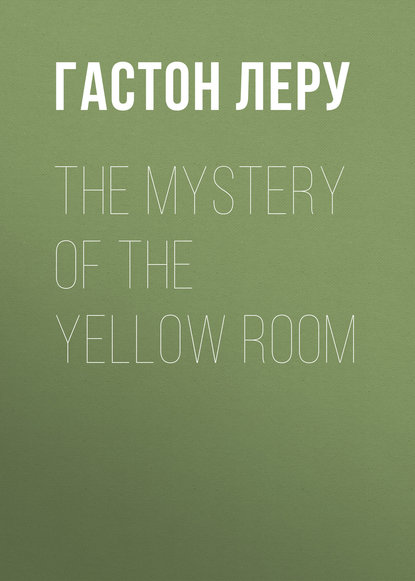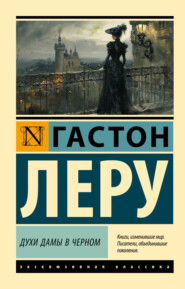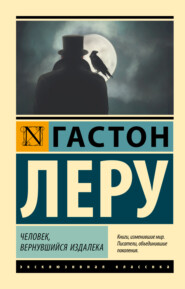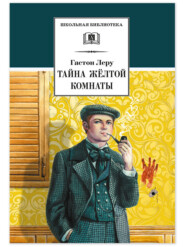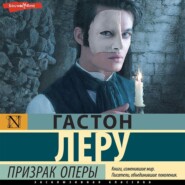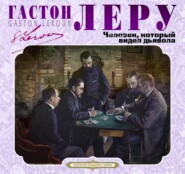По всем вопросам обращайтесь на: info@litportal.ru
(©) 2003-2024.
✖
The Mystery of the Yellow Room
Автор
Год написания книги
2018
Настройки чтения
Размер шрифта
Высота строк
Поля
“Well, my dear Sainclair,—have you read it?”
“The Glandier crime?”
“Yes; “The Yellow Room”!—What do you think of it?”
“I think that it must have been the Devil or the Bete du Bon Dieu that committed the crime.”
“Be serious!”
“Well, I don’t much believe in murderers[1 - Although the original English translation often uses the words “murder” and “murderer,” the reader may substitute “attack” and “attacker” since no murder is actually committed.] who make their escape through walls of solid brick. I think Daddy Jacques did wrong to leave behind him the weapon with which the crime was committed and, as he occupied the attic immediately above Mademoiselle Stangerson’s room, the builder’s job ordered by the examining magistrate will give us the key of the enigma and it will not be long before we learn by what natural trap, or by what secret door, the old fellow was able to slip in and out, and return immediately to the laboratory to Monsieur Stangerson, without his absence being noticed. That, of course, is only an hypothesis.”
Rouletabille sat down in an armchair, lit his pipe, which he was never without, smoked for a few minutes in silence—no doubt to calm the excitement which, visibly, dominated him—and then replied:
“Young man,” he said, in a tone the sad irony of which I will not attempt to render, “young man, you are a lawyer and I doubt not your ability to save the guilty from conviction; but if you were a magistrate on the bench, how easy it would be for you to condemn innocent persons!—You are really gifted, young man!”
He continued to smoke energetically, and then went on:
“No trap will be found, and the mystery of “The Yellow Room” will become more and more mysterious. That’s why it interests me. The examining magistrate is right; nothing stranger than this crime has ever been known.”
“Have you any idea of the way by which the murderer escaped?” I asked.
“None,” replied Rouletabille—“none, for the present. But I have an idea as to the revolver; the murderer did not use it.”
“Good Heavens! By whom, then, was it used?”
“Why—by Mademoiselle Stangerson.”
“I don’t understand,—or rather, I have never understood,” I said.
Rouletabille shrugged his shoulders.
“Is there nothing in this article in the ‘Matin’ by which you were particularly struck?”
“Nothing,—I have found the whole of the story it tells equally strange.”
“Well, but—the locked door—with the key on the inside?”
“That’s the only perfectly natural thing in the whole article.”
“Really!—And the bolt?”
“The bolt?”
“Yes, the bolt—also inside the room—a still further protection against entry? Mademoiselle Stangerson took quite extraordinary precautions! It is clear to me that she feared someone. That was why she took such precautions—even Daddy Jacques’s revolver—without telling him of it. No doubt she didn’t wish to alarm anybody, and least of all, her father. What she dreaded took place, and she defended herself. There was a struggle, and she used the revolver skilfully enough to wound the assassin in the hand—which explains the impression on the wall and on the door of the large, blood-stained hand of the man who was searching for a means of exit from the chamber. But she didn’t fire soon enough to avoid the terrible blow on the right temple.”
“Then the wound on the temple was not done with the revolver?”
“The paper doesn’t say it was, and I don’t think it was; because logically it appears to me that the revolver was used by Mademoiselle Stangerson against the assassin. Now, what weapon did the murderer use? The blow on the temple seems to show that the murderer wished to stun Mademoiselle Stangerson,—after he had unsuccessfully tried to strangle her. He must have known that the attic was inhabited by Daddy Jacques, and that was one of the reasons, I think, why he must have used a quiet weapon,—a life-preserver, or a hammer.”
“All that doesn’t explain how the murderer got out of “The Yellow Room”,” I observed.
“Evidently,” replied Rouletabille, rising, “and that is what has to be explained. I am going to the Chateau du Glandier, and have come to see whether you will go with me.”
“I?—”
“Yes, my boy. I want you. The ‘Epoque’ has definitely entrusted this case to me, and I must clear it up as quickly as possible.”
“But in what way can I be of any use to you?”
“Monsieur Robert Darzac is at the Chateau du Glandier.”
“That’s true. His despair must be boundless.”
“I must have a talk with him.”
Rouletabille said it in a tone that surprised me.
“Is it because—you think there is something to be got out of him?” I asked.
“Yes.”
That was all he would say. He retired to my sitting-room, begging me to dress quickly.
I knew Monsieur Robert Darzac from having been of great service to him in a civil action, while I was acting as secretary to Maitre Barbet Delatour. Monsieur Robert Darzac, who was at that time about forty years of age, was a professor of physics at the Sorbonne. He was intimately acquainted with the Stangersons, and, after an assiduous seven years’ courtship of the daughter, had been on the point of marrying her. In spite of the fact that she has become, as the phrase goes, “a person of a certain age,” she was still remarkably good-looking. While I was dressing I called out to Rouletabille, who was impatiently moving about my sitting-room:
“Have you any idea as to the murderer’s station in life?”
“Yes,” he replied; “I think if he isn’t a man in society, he is, at least, a man belonging to the upper class. But that, again, is only an impression.”
“What has led you to form it?”
“Well,—the greasy cap, the common handkerchief, and the marks of the rough boots on the floor,” he replied.
“I understand,” I said; “murderers don’t leave traces behind them which tell the truth.”
“We shall make something out of you yet, my dear Sainclair,” concluded Rouletabille.
CHAPTER III. “A Man Has Passed Like a Shadow Through the Blinds”
Half an hour later Rouletabille and I were on the platform of the Orleans station, awaiting the departure of the train which was to take us to Epinay-sur-Orge.
On the platform we found Monsieur de Marquet and his Registrar, who represented the Judicial Court of Corbeil. Monsieur Marquet had spent the night in Paris, attending the final rehearsal, at the Scala, of a little play of which he was the unknown author, signing himself simply “Castigat Ridendo.”
Monsieur de Marquet was beginning to be a “noble old gentleman.” Generally he was extremely polite and full of gay humour, and in all his life had had but one passion,—that of dramatic art. Throughout his magisterial career he was interested solely in cases capable of furnishing him with something in the nature of a drama. Though he might very well have aspired to the highest judicial positions, he had never really worked for anything but to win a success at the romantic Porte-Saint-Martin, or at the sombre Odeon.
Because of the mystery which shrouded it, the case of “The Yellow Room” was certain to fascinate so theatrical a mind. It interested him enormously, and he threw himself into it, less as a magistrate eager to know the truth, than as an amateur of dramatic embroglios, tending wholly to mystery and intrigue, who dreads nothing so much as the explanatory final act.
So that, at the moment of meeting him, I heard Monsieur de Marquet say to the Registrar with a sigh:





